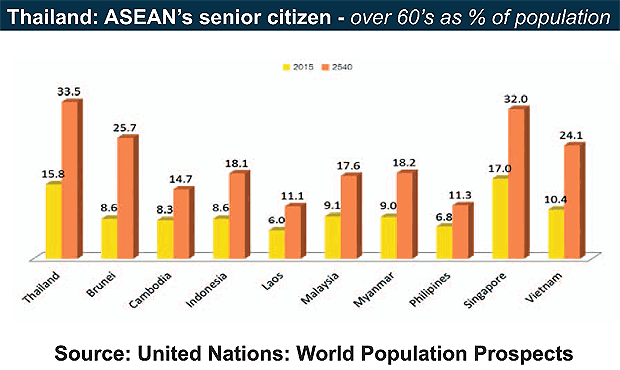Thailand’s Human Resource Situation: the challenge of an ageing population
- Published: Jun 6, 2016 12:35
- Writer: Special Publications | 6,576 viewed
In the not-so-distant past, Thailand was known as a young people’s country. In the 1970’s, life expectancy for males was under 60 years, and an extra five years for females, with under 10 per cent of total population aged 60 years or over. At that time, fertility rates approached five live births per adult female. There were plenty of young people to supply Thailand’s growing labour intensive industries, especially textiles and garments, with adequate workforce left in the fields for basic agricultural production.

But over the past half century, the situation began to change. Life expectancy increased to 71 years for males and seven years more for females, while the over-60’s rose proportionality to 16 per cent of total population, while fertility rates dropped dramatically to 1.6 live births per adult female, well below population replacement rates, which require about 2.1 live births.
These are trends that will continue progressively, with life expectancy reaching 75 years for males and at least 6 years longer for females. The over 60’s will reach a quarter of the total population in less than 15 years from now, and a third of total population by 2040.
These trends will place Thailand not only in the category of an ageing society, but also the most seriously ageing society in the whole of ASEAN, even beyond Singapore, and vastly beyond the Philippines, Malaysia, Indonesia, and Thailand’s immediate Mekong Region neighbours Cambodia, Laos and Myanmar.
Ageing societies are nothing new: Europe is full of them, and Japan, China and Korea also exceed Thailand’s trend. China has its one child policy, recently revised into a two-child policy, to blame. But the other countries are different from Thailand, because they are ageing but also rich. They can afford to be old because their old people have enough money saved up, either through state pension schemes or through private savings, to tide them over for the rest of their natural lives.
Thailand is different: people are getting old. In the vast majority of cases, old people’s savings are also minimal. It is great to be young and rich. It is not ideal, but at least possible to be young and poor. But being old and poor is really tough. In the good old days of smaller total population, higher birth rates and therefore more wage earners able to support fewer elderly people with lower life expectations, the solutions to the older and poor situation were readily available. Young people simply worked for however little money, often lived in extended households, and helped each other to take care of parents and grandparents.
Today’s situation is completely the reverse. Thailand now faces the grim prospect of how to source workforce for industry and, at the same time, how to provide for the elderly.
In terms of financial provisions, we are now facing a multiplicity of challenges. For one thing, we are in a world of low interest rates, which make it difficult for old people with savings to conserve capital and live from interest yields. If this situation prevails, it will also be difficult for younger people to invest and amass savings through good yields. Thailand’s Social Security Fund does now cover 11.5 million private employees working with over 400,000 employers, but the monthly pension yield would be significantly less than the current minimum wage. The non-contributory old age benefit scheme currently provides for barely two days of minimum wage per month and is hardly a solution.
Are there any solutions? Well, yes there are, but as yet only partial ones.
Leave aside euthanasia: Thailand will certainly not resort to disposing of its senior citizens. Cutting back on longevity will not be happening, because better healthcare will have the opposite effect. Producing more children is not going to work. The cost of rearing them, especially educating them, is too expensive, and working women prefer smaller families. Immigration provides a short-term solutions but is unlikely to be politically popular, even among ASEAN neighbours.

The Civil Service Commission is taking a step in the right direction, by proposing an extension of working life to 65 years. But this is only a partial response to a broader challenge. Singapore is already moving to a 67 years old retirement age. It will be necessary, as life expectancy increases, to move steadily further, into the 70’s and eventually even beyond. This will mean that younger people will be impatient for promotion and top jobs. But again, Singapore offers a possible solution, in the form of lighter, easier jobs for older people. This can mean an extra stage of life: a whole range of “retirement jobs” intellectually satisfying but less physically demanding.
The real and immediate need is to recognise the implications of the ageing society, with serious occupational, financial, psychological planning. Organizations must forsake the idea of the 60 or 65 retirement age, and recognise the inevitability of lifelong gainful activity, at whatever level of employment. After all, who really wants to retire, vegetate, and become a bystander as the world around one moves excitingly forward?
Christopher F. Bruton, 45 years in Thailand, is Executive Director of Dataconsult Ltd, a local consultancy. He can be reached at chris@dataconsult.co.th.


